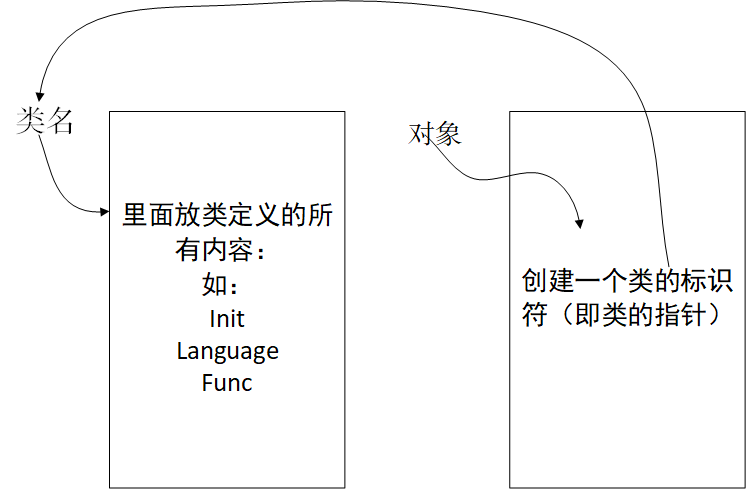第二十三天面向对象的第二天
1.使用面向对象编写求正方形面积和周长的程序:

class Square: def __init__(self,side_len): self.side_len=side_len def permeter(self): return self.side_len*4 def area(self): return self.side_len*self.side_len ret=Square(4) ret1=ret.permeter() print(ret1) 结果为 16
2类里面主要有两种属性:静态属性和动态属性,一般类里面定义的都是静态属性,函数里定义的大多都是动态属性
3.上一节可我们了解到可以使用类名.对象来查看类中的变量属性,但是不能进行修改可以使用下面方法进行修改:

class Money: money=100 def __init(self): pass Money.money=200 #通过此方法来对类里的属性进行修改 print(Money.money) 结果 200
4.也可以使用对象名对类里面的属性进行读取但是不能修改,如果进行修改是在其对象的字典里增加一个键值对:

class Money: money=100 def __init(self): pass Money.money=200 #通过此方法来对类里的属性进行修改 print(Money.money) ret=Money() print(ret.money) #通过此方法来对类里的属性进行查看 ret.money=300 print(ret.money)#无法进行修改只能增添此对象里面的键值对 结果为 200 200 300
4的内存空间执行过程如下:

5.如果类中的属性是可变数据类型,那么在程序中会有什么不同的效果那:

class Course: language='chinese' def __init__(self,teacher,course_name,period,price): self.teacher=teacher self.name=course_name self.period=period self.price=price def func(self): pass alex=Course('alex','python',5,14444) small=Course('small','python',5,14444) print(small.language) #使用不可变数据类型,未修改之前调用的值都一样 print(alex.language) 结果为 chinese chinese

class Course: language='chinese' def __init__(self,teacher,course_name,period,price): self.teacher=teacher self.name=course_name self.period=period self.price=price def func(self): pass alex=Course('alex','python',5,14444) small=Course('small','python',5,14444) alex.language='English'#不会修改类属性里面的值而且此对象以后调用时优先调用此值 print(small.language) #还是继续使用类属性里面的值 print(alex.language)#使用不可变数据类型,修改其中一个调用的值发生改变 结果为 chinese English
如果时可变数据类型:

class Course: language=['chinese'] def __init__(self,teacher,course_name,period,price): self.teacher=teacher self.name=course_name self.period=period self.price=price def func(self): pass alex=Course('alex','python',5,14444) small=Course('small','python',5,14444) alex.language[0]='English'#如果是可变数据类型,并且不是赋值,而是改变索引上的值,则类属性里的值发生改变 print(small.language) print(alex.language) 结果为 ['English'] ['English']
这个执行过程如下:

6.总结对于可变数据类型修改是共享的,重新赋值时独立的。而不可变数据类型赋值就相当于独立。
7.模拟人生的程序:

class Person: monkey=0 mother=Person() father=Person() father.monkey+=1000 mother.monkey+=1000 print(Person.monkey) 结果为 0
发现挣得钱没有体现出来,

class Person: monkey=0 def work(self): Person.monkey+=1000 mother=Person() father=Person() mother.work() father.work() print(Person.monkey) 结果为 2000
8.创建一个类,没实例化一个对象就进行一次计数,最终所有的对象共享此数据:

class Count: count=0 def __init__(self): Count.count+=1 f1=Count() f2=Count() print(f1.count) print(f2.count) f3=Count() print(f1.count) 结果为 2 2 3
9.初始绑定方法:

def func(): pass print(func)#打到的时调用函数的内存地址 结果为 <function func at 0x0000026AED832EA0>

f1=Foo() print(Foo.func)#这个打印的是Foo.fun的内存地址 print(f1.func)#由最后一个可知后面是类的对象然后前面意思为类对象里方法的调用 print(f1.func1) print(f1) 结果为 <function Foo.func at 0x0000027BB2385620> <bound method Foo.func of <__main__.Foo object at 0x0000027BB21E9080>> <bound method Foo.func1 of <__main__.Foo object at 0x0000027BB21E9080>> <__main__.Foo object at 0x0000027BB21E9080>
10包里面也有init为什么调用包之后就会执行init文件:
答:import一个包就相当于对类进行一次实例化,然后就相当于调用了类,就会执行init文件,

import time #类的实例化 time.time()#相当于对对象进行调用方法 结果为 1582536792.7421083
11.给人狗大战中的人添加一个武器程序:

class Dog: def __init__(self,*args): self.name=args[0] self.blood=args[1] self.aggr=args[2] self.kind=args[3] def bite(self,person): person.blood-=self.aggr class Person: def __init__(self,*args): self.name=args[0] self.blood=args[1] self.aggr=args[2] self.sex=args[3] self.money=0 def attack(self,dog): dog.blood-=self.aggr def get_weapon(self,weapon): #给人添加一个武器 if self.money>=weapon.price: #判断自己的钱是否满足武器的钱数 self.money-=weapon.price #卖武器之后剩余的钱数 self.weapon=weapon #自己定义武器 self.aggr+=weapon.aggr else: print('余额不足,请先充值') class Weapon: def __init__(self,name,aggr,njd,price): self.name=name self.aggr=aggr self.njd=njd self.price=price def handl8(self,person): if self.njd>0: person.blood-=self.aggr*2 self.njd-=1 alex=Person('alex',0.5,100,'不想') jin=Dog('金老板',100,500,'teedy') w=Weapon('打狗棒',100,3,998) alex.money+=1000 alex.get_weapon(w) print(alex.weapon)#输出人拿到武器后所有的属性 print(alex.aggr) alex.attack(jin) print(jin.blood) alex.weapon.handl8(jin) print(jin.blood) 结果 <__main__.Weapon object at 0x0000019A9262B470> 200 -100 -300
12.求圆环类或者圆形类的面积和周长:

from math import pi class Circle: def __init__(self,*args): self.r=args[0] def permeters(self): return 2*pi*self.r def area(self): return pi*(self.r**2)#要用括号保证优先级 class Ring: def __init__(self,outside_r,inside_r): self.outside_c=Circle(outside_r) self.inside_c=Circle(inside_r) def area(self): return self.outside_c.area()-self.outside_c.area() def perimeter(self): return self.outside_c.permeters()+self.outside_c.permeters() 942.4777960769379
13.创建一个老师的类,老师也有生日,生日也可以是一个类使用组合:

class Birthday: def __init__(self,year,month,day): self.year=year self.month=month self.day=day class Course: def __init__(self,course_name,period,price): self.name=course_name self.period=period self.price=price class Teacher: def __init__(self,name,age,sex,birthday,course): self.name=name self.age=age self.sex=sex self.birthday=birthday self.course=course b=Birthday(2019,11,4) c=Course('python',6,10000) ret=Teacher('alex',15,'男',b,c) print(ret.course.price) 结果为 10000




